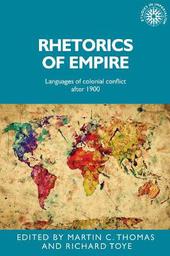
|
Rhetorics of Empire: Languages of Colonial Conflict After 1900
Hardback
Main Details
| Title |
Rhetorics of Empire: Languages of Colonial Conflict After 1900
|
| Authors and Contributors |
Edited by Martin Thomas
|
|
Edited by Richard Toye
|
| Series | Studies in Imperialism |
|---|
| Physical Properties |
| Format:Hardback | | Pages:272 | | Dimensions(mm): Height 234,Width 156 |
|
| Category/Genre | Colonialism and imperialism |
|---|
| ISBN/Barcode |
9781526120489
|
| Classifications | Dewey:325.320141 |
|---|
| Audience | | General | | Tertiary Education (US: College) | | Professional & Vocational | |
|---|
| Illustrations |
2 black & white illustrations
|
|
Publishing Details |
| Publisher |
Manchester University Press
|
| Imprint |
Manchester University Press
|
| Publication Date |
31 August 2017 |
| Publication Country |
United Kingdom
|
Description
Stirring language and appeals to collective action were integral to the battles fought to defend empires and to destroy them. These wars of words used rhetoric to make their case. That rhetoric is the subject of this collection of essays exploring the arguments fought over empire in a wide variety of geographic, political, social and cultural contexts. Why did imperialist language remain so pervasive in Britain, France and elsewhere throughout much of the twentieth century? What rhetorical devices did political leaders, administrators, investors and lobbyists use to justify colonial domination before domestic and foreign audiences? How far did their colonial opponents mobilize a different rhetoric of rights and freedoms to challenge them? These questions are at the heart of this collection. Essays range from Theodore Roosevelt's articulation of American imperialism in the early 1900s to the rhetorical battles surrounding European decolonization in the late twentieth century. -- .
Author Biography
Martin Thomas is Professor of Imperial History at the University of Exeter Richard Toye is Professor of Modern History at the University of Exeter -- .
Reviews'It is a pleasure to read a volume in which rhetoric is subject to such sustained scrutiny across such a wide range of modern imperial contexts...I would simply direct readers to an engaging collection of high-quality chapters focused on subjecting a single theme to sustained and invigorating scrutiny.' Christopher Prior, University of Southampton, Journal of contemporary History, Vol. 54, No. 2 -- .
|